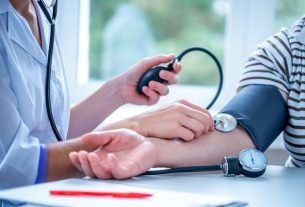To control high blood pressure effectively, in addition to the treatment recommended by your doctor, it is essential to make changes to some lifestyle habits, as much of what we do or eat directly affects blood pressure. Thus, some of the essential attitudes to reduce pressure are losing weight, practicing physical activity and stopping smoking, for example.
Some changes, however, are not easy, as no one deserves to eat tasteless food and you can’t lose weight overnight, for example, so these 5 tips can be followed on a daily basis, including during pregnancy. to make these goals easier to achieve:

1. Replace salt with other seasonings
Salt is not the only seasoning that can add flavor to food, and there are many options to replace it, and you can invest in seasonings such as: pepper, onion, garlic, ginger, oregano, parsley, coriander, basil, saffron, bay leaf and rosemary. It is possible to indulge in these seasonings without guilt, and also be able to alternate them and discover new flavors.
Furthermore, you should avoid canned, processed and frozen foods, or ready-made seasonings, such as cubes or jars, as they contain a lot of salt and other additives that cannot be controlled, and are contraindicated for those with hypertension. Therefore, it is important to prefer foods prepared at home, or in the most natural way possible.
If you have to eat out very often, it is recommended to take lunch boxes from home, which can even be made all on one day a week and frozen in separate containers.
2. Practice physical activity regularly
Practicing physical exercise is essential to help control blood pressure and improve blood circulation, helping to prevent and treat various diseases. However, this effect will only be achieved if the exercises are practiced regularly, at least 3 times a week.
So, there’s no point in trying too hard at the gym for 3 days in a row, and then not going there for 10 days, or just doing activities on the weekends. Just as medicine must follow a routine, physical activity must also be seen as a treatment and, more than that, an investment in better health and quality of life.
3. Control stress
Stress and anxiety cause several negative reactions in the body, such as the production of hormones such as cortisol, adrenaline and insulin, which can cause blood pressure to constantly increase, even with correct treatment.
Therefore, looking for alternatives to reduce daily stress levels, even if the routine does not help, is recommended to help control blood pressure. Great alternatives for this are carrying out practices such as meditation, yoga, massage, acupuncture and pilates. Practicing physical activity also helps regulate hormone and stress levels, even if it’s just a 30-minute walk.
4. Sleep between 6 and 8 hours a night
For the heartbeat and blood vessel flow to normalize, allowing better control of blood pressure, at least 6 hours of sleep per night is necessary. Therefore, although it may vary from person to person, the ideal is for sleep to last around 7 hours, with more than 8 hours also not beneficial for health, increasing the risk of cardiovascular diseases.
Furthermore, it is also important to have a relaxing and restful sleep, avoiding insomnia and nighttime agitation, which harm the effect of sleep on health. Check out the 10 tips for sleeping well.
5. Taking your medicine at the correct times
It is important that blood pressure medications are taken at the intervals recommended by the doctor, every 8, 12 or 24 hours, for example, and it is important that they are taken at the same times every day. This discipline is important, as the effect of medications varies over time, so if the person delays or anticipates taking the medication, the effect may vary.
An example is, if a medicine must be taken every 8 hours, its interval can be either at 6 am, 2 pm and 10 pm, or at 8 am, 4 pm and 12 pm, for example. Thus, breaks are respected, but the schedule is defined according to each person’s needs, and it is preferable that they are the same times every day. If there is any difficulty in following the medication schedule, it is important to talk to the doctor to assess the possibility of adjusting or even changing the medication.
A tip not to forget is to set an alarm clock or cell phone to notify you when the time is right, and always carry a box with some medicines in your bag or wallet to use when you are not at home.

List of the worst foods for hypertension
The foods on this list should be avoided by hypertensive people, as they contain a lot of salt and make it difficult to control blood pressure.
- Salt crackers and other savory biscuits;
- Butter with salt;
- Cured cheeses;
- Potato chips with salt;
- Olives;
- Canned;
- Embedded foods such as sausage;
- Smoked sausages;
- Salted meats;
- Salted fish;
- Sauces;
- Knorr-type meat or chicken broths;
- Soft drinks;
- Ready-to-eat processed foods;
- Café;
- Black tea;
- Green Tea.
Furthermore, on a high blood pressure diet it is also important to read food labels carefully because salt may be described as sodium, sodium chloride or monosodium glutamate. Products with this description in the nutritional information should be avoided by hypertensive patients.
See also other nutritionist tips for lowering high blood pressure:




